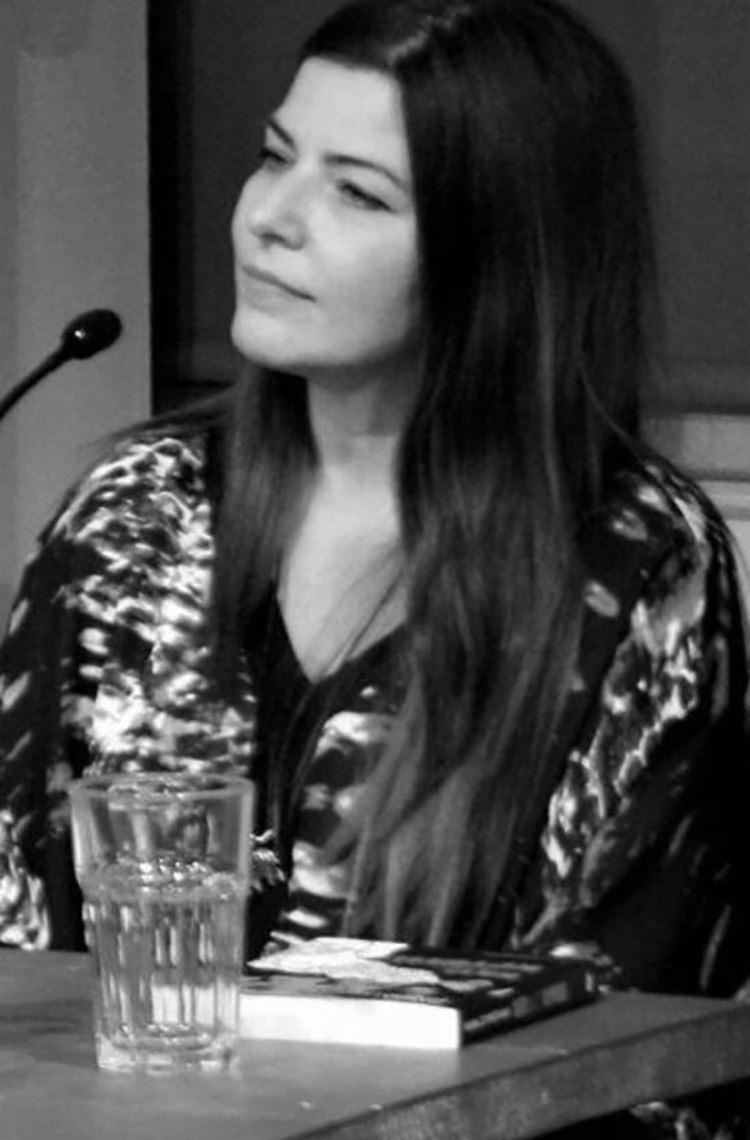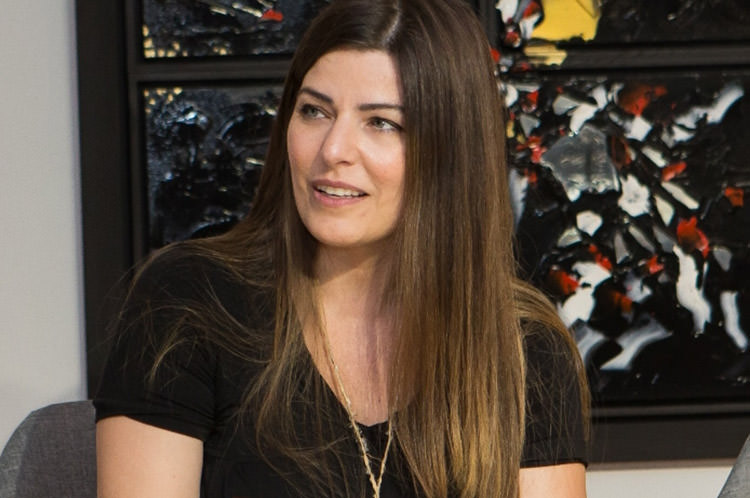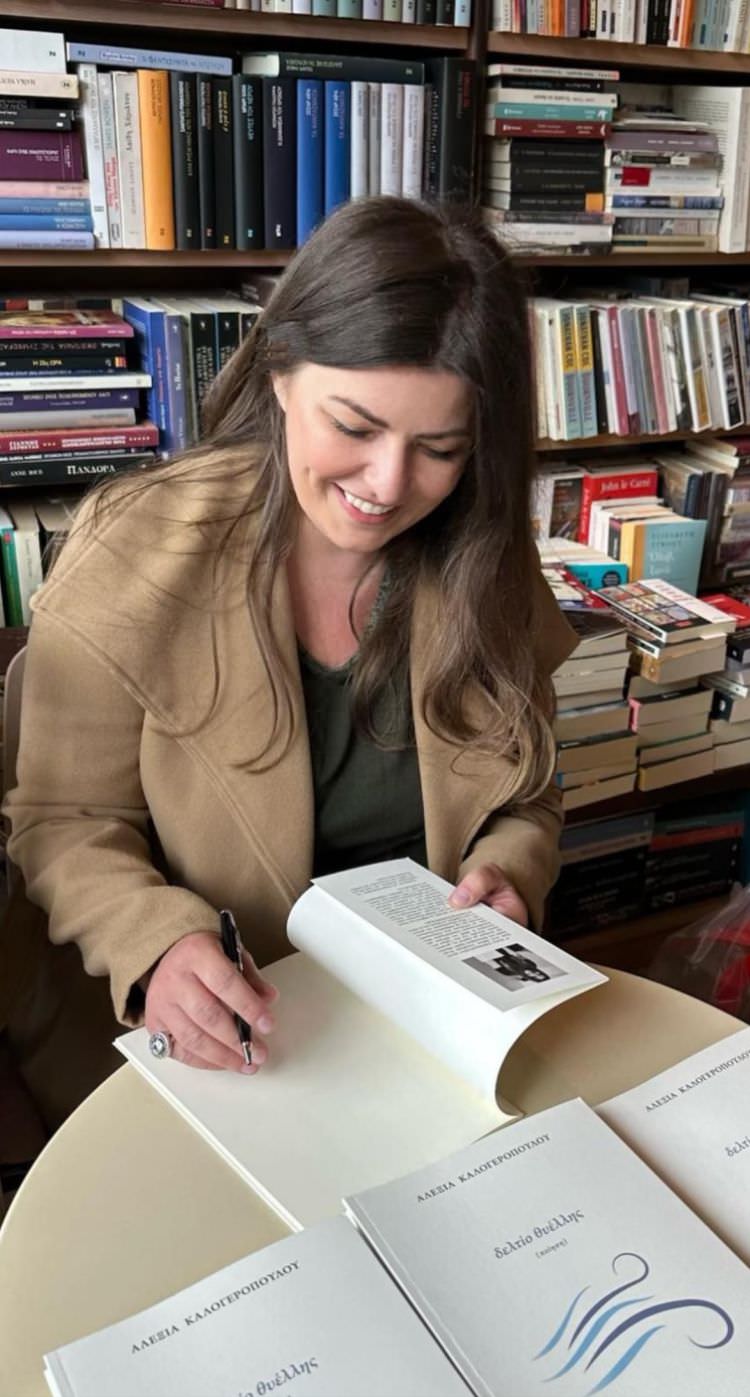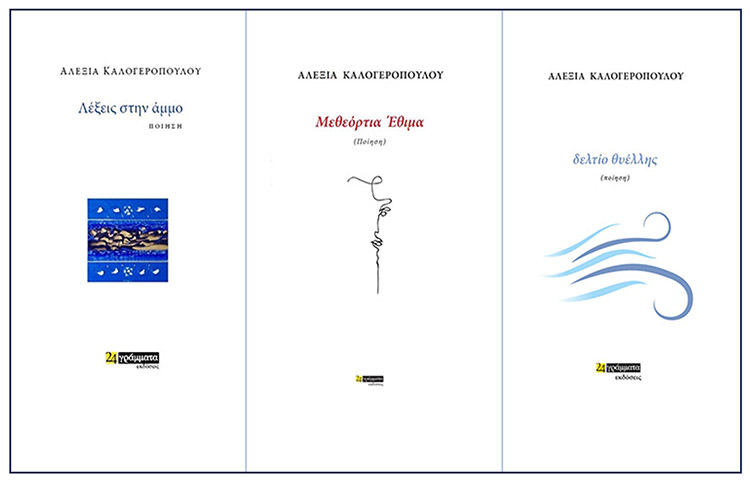Alexia Kalogeropoulou
"In poetry someone dives into his inner world without certainties and interpretations, takes a leap that he doesn’t know where it will take him. It brings out thoughts and feelings, parts of himself that he may not even known existed..." Alexia Kalogeropoulou
"Alexia Kalogeropoulou with her work shows us that the baton is deservedly passed from one generation of poets to the next, that poets will always have a raison d'être, especially in the uncertain technological era that overwhelms us, that poetry will forever honor its unmatched affinity for inductive thought, looking at the person nearby and for social becoming. Her writing is a unique amalgam of challenge to our critical thinking, aesthetic pleasure and productive emotion." George Douatzis
She is undoubtedly one of the most important and charismatic writers of her generation. She studied psychology at the University of Athens and then completed postgraduate studies at the Faculty of Communication and Mass Media of the Athens University of Applied Sciences, specializing in cultural studies and human communication. She has worked as a journalist for print and online media and she is the founder of the literary website Booksitting. Her literary texts and poems have been included in anthologies and published in literary magazines. Her most recent poetic work, entitled Deltio Thyellis, was published in 2022 (24 issues of Letters) and received rave reviews. Her texts are substantial, substantive, person-centred, and "lead" the reader to main issues and concerns of our modern society. This is all about Alexia Kalogeropoulou.
Giota Eftaxia: Ms. Kalogeropoulou, we welcome you to "Radio Art". It is a great pleasure for me and the whole team to have this interview with you. Thank you so much!
Alexia Kalogeropoulou: Ms. Eftaxia, I would also like to thank you and "Radio Art" for this interview. It is a great pleasure for me to talk with you.
G.E.: ‘’Deltio Thyellis’’, your latest book of poetry (December 2022). It is essentially a long poem of about 30 pages that contains your thoughts, your reflections on the facts that beset modern society. How did you come up with the idea for the title of this poetry book?
A.K: The title ‘’Deltio Thyellis’’ is, of course, metaphorical and wasinspired by the dystopian climate that prevailed last September, in the fall of 2022, when this poem was written. At that time, we were constantly bombarded with unpleasant predictions of a harsh winter, of energy and food shortages, we lived under the constant threat of a possible third world war, the problematic outcome of the health care crisis, and much more. All of this led to an extremely stressful atmosphere where fear and uncertainty had replaced joy and gratitude for life. Fear and increasing anxiety about the future no longer allowed clear thinking. This poem warns of the downward pull that life could take, reminding us of beauty, and urges us to do as much as we can from the state anyone is.

G.E.: Does everyone traverse the way of his life trying to face his personal storm? Is there any way to avoid this storm and its dangers?
A.K.: "Passions common to all", to recall Phokylide. Every person has to deal with his own inner storm, but also with external storms that are often beyond one's control. Of course, storms in nature do not only have negative consequences. They are also beneficial for drought, but also for thermal balance. Something similar happens in the human psyche. A storm can serve as a trigger for change, a reminder of our deepest needs. The better prepared and armored we are, the less the shocks in our lives will be and the faster we will recover. Preparation requires self-knowledge, resilience, and optimism: a belief in a better future, not through a miracle, but through our own actions.
GE: Do you think poetry requires an inner search?
AK: Yes. At least for me, it's an existential need, a need for inner search, a need to find out where you stand in the world. It is an introverted attitude that is completed when it turns outward, when it becomes extroverted and shared with the world. Otherwise, it is navel-gazing.
G.E.: Is poetry experienced or does it lead to experiences?
A.K.: In my opinion, poetry is read not only with the mind, but also with the senses. It engages us completely. So, a poem is experienced when we read it, but it also creates indirect experiences for the reader through the images it creates. As far as the poet is concerned, experience is of great importance in writing. It's not just a mental process, but also involves the soul and the body.
G.E: You also studied psychology at the Athens School of Philosophy. Both, I dare say, listen to the rhythm of the human soul. Could one say that poetry is a psychograph of the emotions?
A.K.: Psychology as a science obeys some rules, studies human thought and behavior, tries to interpret it and comes to general conclusions. In poetry, you dive into your inner world without certainties and interpretations, you take a leap that you do not know where it will lead. It brings out thoughts and feelings, parts of oneself that one may not have even known existed. In this respect, poetry is more suited to psychotherapy.
G.E: In 2020, you published your book of poems "Metheortia ethima", which admittedly touched me deeply when I read it. I picked out your poem titled " Man Accustoms Himself." I read a passage: Man gets used to it[…] He gets used to everything / and everything is fine with him / as long as he sees nothing else / as long as nothing wakes him / from his slumber. I wonder how it is possible for man to escape the power of habit? To wake up from slumber?
A.K.: Thank you very much for your kind words. It is not easy for man to escape from the power of habit. "Six second natures," said Aristotle in one of his most famous sentences. Often, we are so immersed in habit that we think "this is the way we are" and that we cannot change. As I mentioned earlier, self-knowledge is needed to recognize what belongs to us and what does not, what works in our lives and what does not, and of course a strong will to change, to replace old habits with new ones.

G.E.: How can one remain authentic in a society where prevails the image, the exterior and which is daily attacked by intense social phenomena? To not be carried away by the dynamics of the "monster"?
A.K: I think that the image, the appearance, has always been dominant in society, just in a different way. Remember, for example, the well-known "What will the world say?" that even grandparents used, or the need to show one's socioeconomic status or moral values through dress codes, appearance, and behavior. All this, in most cases, had nothing to do with authenticity, but mainly with the need to be part of a whole, with conformist thinking. I believe that authenticity is achieved primarily through self-knowledge, honesty with ourselves and others, coherence between what we stand for and what we do, and liberation from the importance we attach to others' opinions about our choices. The latter, of course, does not cancel out respect for fellow human beings, which is one of the basic conditions for the cohesion of a society.
G.E.: You will permit me to quote a passage from Symphony No. 1 by the great poet Tasos Leivaditis, which was cause for reflection: [… ]Because people comrade, start to exist at the moment/ they find a place/ in the lives of others. So, does the life of man begin from the moment he finds a place in the life of others?
A.K.: From our birth, from our first moments in the world, we need the other to exist, someone to take care of us, and that is usually the mother. In my opinion, nothing has the same value if it is not shared. When a child draws, he will show his drawing to others, he will share it with others and at the same time he will share a part of his existence with them. When others see us, we exist. And when we share, we share who we are and enrich our existence.
G.E: In today's social media dominated times, are we creating illusions of sociality and therefore not living? How can we preserve our uniqueness?
A.K.: Social media relationships tend to be superficial. They are like those people had in other times, such as at a booth, where they said a “hello” and a few words about neutral topics such as the weather, but rarely revealed personal information that presupposed a relationship of deep intimacy. In essence, social media has shifted our microcosm from our neighborhood and place of residence to an online platform, expanding the context of the microcosm to people who may live in other places or even on other continents. Thus, superficial "friends" have multiplied, and eventually there is a lack of time and space to communicate with them, even virtually.
As for your question, I think that people who used to be more social, who liked to socialize, maintain their sociality even in the age of social networks. As long as people moderate themselves and are self-aware, I do not think socializing is threatened by social media. What's really tiring and disorienting is having your experiences, your life as a whole, mediated through social media and the cell phone camera. It's one thing to take five to ten minutes to take a photo and post it on social media, and it's another to live the whole experience mediated and build up a false image. So, the boundary is important. Our uniqueness, on the other hand, I think has to do with our material, with who we are, and not with social media. Nobody can take it away from us as long as we take care of it and cultivate it.
G.E.: I’m reading an excerpt from your last poetic work Deltio Thyellis, which we have already mentioned: […] time gnaws/ at youth/ at laughter/ crushes existence/ together with love. So, time is inexorable. Does this path from East to West frighten you?
A.K.: This path has always worried me, this tragedy of existence and non-existence, where one is you and the other is not. It makes everything seem insignificant. Much of what we do can be an attempt at deliberate distraction to keep us busy, so we do not have to wonder what the point of our birth is, if we assume that everything in nature has a purpose. But that is the cycle of life. Mortality is a part of life throughout the animal and plant kingdoms. For us humans, the end, the separation from life, is more difficult, perhaps because in the urban environment we have a distorted illusion of eternity, being cut off from nature. The tragedy, in my opinion, is that people die prematurely who have not yet completed their life cycle, assuming that the cycle completes itself in old age.

G.E.: From the moment we are born we are tenants of this world. Then why do we do what we do?
A.K.: We usually follow what our socialization dictates: First the mentality and the rules of behavior of the family, later those of the school, the peer group, the religion, the society in general. Many people, perhaps most, come and go through life without asking themselves why they do what they do, why they think and behave in a certain way. Worst of all, they believe that only their way is right, that they possess the only truth, and miss the opportunity to enrich their lives with new meanings. Others, realizing superficially, but knowing deep down that have nothing in the face of the inevitable end, cling to powers, trying to assert themselves, to acquire as much as they can in order to feel great. This is how wars are fought.
But allow me to vary your question a little: What would it benefit us and society to do? As you quite rightly said, we do not own the world, we are tenants. In my opinion, the ideal life is a mixture of stoicism and subsidiarity, that is, a virtuous and pleasant life. Virtuous not in the moralizing sense, but essentially. As little harm as possible, as much benefit as possible. Enjoying life with respect for oneself, nature and others. Of course, overemployment, long hours and moderately paid work do not leave much room for a pleasant life.
G.E: There are times when I want to say the unspeakable/ and what I never dared to do/ a fugitive from a life of inertia/ struggling day and night with what has been done/ those who follow and those who are now. (From the collection Words in the Sand (2019)). What would the world be like if all the unsaid came to light?
A.K.: Sometimes the unsaid is unrecognizable, it has not yet been transformed into concrete thoughts and thus words. Then we usually feel a general uneasiness that we cannot name with certainty. But it can also be about things we do not want to share, so as not to hurt others or disturb the fragile balance of life. If everything unsaid came to light, our world might be more honest, but also more chaotic.
G.E.: Mrs. Kalogeropoulou, let us close our wonderful conversation with light, with optimism and, of course, with a quote from the poem Hope (from the poetry collection Words in the Sand (2019)): In the evening we searched the sky for the brightest star/ as a sign of hope for something that will come/ that is near, "you will see, it will come," we said to each other. And we still wait optimistically for something else/ but not wrongly. Yes, there is something flickering. What is it that glows for you?
A.K.: There is always a glimmer of hope. The belief that everything will be all right in the end. Even in the most difficult times, this little light of hope gives strength and leaves no room for resignation.
G.E.: Mrs. Kalogeropoulou, thank you very much for this beautiful interview. I sincerely wish you much more success in your work. And let us hope that the brightest star in our sky will never be lost.
A.K.: Thank you very much and I look forward to it!
Selection of poems

‘’Words in the Sand’’ (24 Grammata Publications, 2019)
Nothing
I passed by my old neighborhood yesterday.
Two trees missing: an old pine
and a fig tree with lots of fruit,
which reminded us that once – not so long ago – here,
where cement now teems, nature harvested.
In their place emptiness. Nothing.
Nothing to awaken the senses and the memories,
so that you and I could forget the evening star.
April the 9th.
It was April the 9th in the used calendar,
squiggly with confusing drawings with no point.
The almond trees had blossomed long ago,
and the flowers more and more multiplying
laying on the mountain ridges and in our gardens.
And among them a rose that opened hundred times
and survived the rain without closing.
Strength. That is what is needed in all the battles.
Meaning
One day, it must have been afternoon, I counted my silence,
and it was more than all my words.
They guiltily carve the depths of the soul
like an invisible sculptor
long burnt out.
But each time silence turn into words,
a meaning emerges, an implicit cry.
Mother’s hug
Mother's hug was always embellished with flowers.
Sometimes smelled like sourdough bread
and others like a green soap.
Cozy nest,
even when her youth was growing
and tousled was her hair in the wind.
‘’Metheortia Ethima’’ (24 grammata editions, 2020)
Outworn shoes
I put on my old shoes,
the outworn ones,
and I went out in the streets of yesterday
to walk
next to memories and faces of the dead.
And I saw blondies on homebrew boats,
sailing late at night
to foreign lands
and dreams buried
in the heat of the day.
And I was dancing sometimes tango
and sometimes rock
following the beat others were giving me.
But that’s enough.
I already hear the drum,
my own drum, beat
and I can no longer ignore it.
Light
With blue and red color
I wanted to change my life,
painting
what was once colorless or gray.
But as I was waiting for the colors to dry,
I changed my mind
and I said that I wanted to make everything yellow
to have some of the sunlight.
And I put straws in the city streets
and fruitful lemon trees on the sidewalks.
I decorated the tacky buildings
with blooming daffodils
and I welcomed with eyes closed the hottest sun rays.
You wanted to be like them
You wanted to be like them.
To say hello to the crowd
with an intellectual style,
slavish
in front of the future leader,
take selfie photos
under a corner carefully planned.
You wanted to be like them.
Poor in deeds, rich in words.
Walking on paths easily
by others engraved,
instead of struggling
to open your own, new paths,
even if you have to bend to uproot the fodder
and the stones that hinder your step.
You just wanted to be like them,
whom you admired ever since you were a child
for what seemed to have happened,
blind to what now it is.
Wait a moment
Wait a moment
Don‘t run away anymore.
You didn't see your child’s
first steps,
the most important ones.
You didn’t have time to sate it
holding his little hand.
You didn't see it going up
the steps of the slide
and then twirling happily around.
Wait.
You didn't have time
to find out who you are
and who you can become.
Wait.
How blue the sky is.
See the autumn’s colors
on the bare branches
and in the falling leaves.
Wait a moment.
Breathe
Against what is happening,
in the wry look,
in the empty embrace,
in the unequal struggle of life and death,
it seems you have no other choice.
Breathe, like the wind that harvests everything.
Breathe on the floating land of intellect itself.
Breathe as if you had never felt the air again,
stinging your nostrils.
As if you didn't get to see what everyone else sees.
As if this was your last breath.
Τhis.
Beginning and end.
Breathe.
‘’Deltio Thyellis’’ (24 grammata editions, 2022)
The winter is predicted to be difficult
and the spring too
the summer hot
and the autumn shambled
once the spring used to bring blooming
the summer carelessness
the autumn beginnings
and the winter caution
where have all the seasons gone
they have become one
a difficult time
with fear without mercy
a crescendo of terror
without purification
- where shall I be held?
all the handholds I knew now slippin
---
What have you done today, dad?
Did you make the world a little better?
And you, mom?
what good have you done today?




